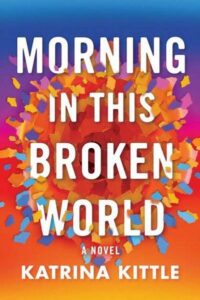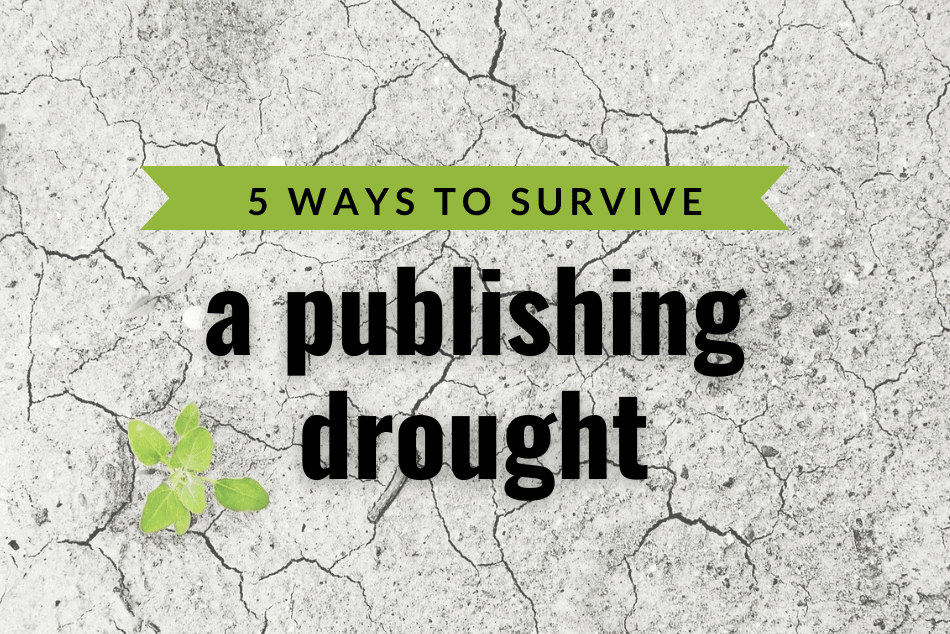By Katrina Kittle
Last summer, on faculty for a writing conference, an attendee asked me, “What do you think is your greatest professional achievement?” In the seconds of pause that feel like a century, I ran through some options in my mind, but they all felt false. And when the right answer occurred to me, it came with clarity:
I never gave up.
My sixth novel, Morning in This Broken World, releases September 1 (and is available early as an Amazon First Reads selection for August), but my last book came out in 2011. I learned some valuable tips during those years about surviving a drought. But I want to stress: This was a publishing drought, not a writing drought. Readers would send me emails and letters, asking, “Are you still writing?” “Do you ever think you’ll write another book?” And depending on the day, those questions filled me with hope—people still wanted my stories—or with seething rage: “Yes, I’m still writing! I never stopped writing! I’ve got two full completed manuscripts and I can’t find publishing homes for them!”
I would never give that answer, because the self-pity story, or the story that I was somehow owed continued success, was not one I believed in or wanted to tell. Droughts happen. Publishing is a humbling business, at every stage.
I’ve seen lots of articles about surviving a creative drought or writer’s block … but none that offered help in keeping the faith and fight during a publishing drought during an established career. We push to get ourselves into the game, but then discover it can be equally difficult to remain in the game.
Here’s what helped me:
-
I asked myself: Why do you write?
Seriously: Why did I start writing in the first place?
A Martina Navratilova quote that I love says: “The moment of victory is far too short to live for that alone.”
We all want to be published, but when you are published, that bar shoots higher and just keeps moving: You need to be published well, you need to get good reviews, you need to sell well, you need to be a bestseller, you need a movie made of your book. It never ends. So those fleeting victories can’t be why we do this. Right?
I write because I love words and stories. I am happiest taking something that exists only in my imagination and making it come to life on the page.
-
I asked myself: Did I love it enough?
Did I still want to be a writer? For a moment the realization felt thrilling—that I didn’t have to do this. I looked around at all the people I knew who were not trying to write books. They seemed perfectly happy.
But I discovered that even without a contract, I did still want to do this. When I wasn’t writing a book, I wasn’t happy. And that was a good thing to know.
I tried to quit and I was miserable.
Writing is what I need to feel alive and happy.
-
I changed my self-sabotaging stories.
Tara Conklin says, “Your greatest work of art is the story you tell about yourself.”
When people would ask me about a new book, I caught myself jokingly saying things like, “Maybe I’m not a writer anymore,” or “I used to be a writer.” It reminded me of what I’d say to people before I was published: “I’m not a real writer” or that I was “a wanna-be writer.” The actual truth was that my writing was so important to me that discussing it with other people scared me.
I was afraid people would think I didn’t have what it takes, so I said it myself—they couldn’t insult me or dismiss, because I was doing it first. But all I was doing was giving others—and myself—permission not to take my writing seriously.
Here I was, a decade after my last book was published, falling into that same toxic habit again. Once I recognized it, I stopped apologizing for the delay and started stating, “Yes, I’m still writing. I’m always writing. I’m currently looking for new representation,” and eventually, “My new agent has me on submission.”
How do you describe yourself and your work? Anything you need to revise?
-
I learned to separate my writing life from my publishing life.
That was key to keeping me sane and happy. Combining them made the writing murky, and took the joy away because I’d gotten swept up in the external validation of publishing. I’d handed the outcome of my goals, my very happiness, to someone else to control.
So, I shifted my goals to what I could control: I could write a story I loved, I could continue to study and improve my craft, I could polish and hone a book to the best of my ability. And I could continue my search for an agent and publisher, in the patient hope that I’d find someone who felt the same energy and enthusiasm for my work.
A quote from Tyler Knott Gregson really struck home for me: “Promise me you will not spend so much time treading water and trying to keep your head above the waves that you forget, truly forget, how much you have always loved to swim.”
I had forgotten how much I had always loved to write.
-
I returned to a sacred, daily writing practice.
This practice became my oasis, my source of water in the drought. Keeping a writing practice simply meant that I would continue to write, to set weekly goals and challenges, to commit to a schedule, even though all these deadlines were self-imposed.
With the new book deal, it finally rained. And, yes, signing that contract felt awesome, and absolutely, it was a relief … but I realized the writing practice is what mattered to my daily happiness and mental health.
Droughts are inevitable. But we can conserve our faith and joy until the rains come again.

 Katrina Kittle’s newest novel, Morning in This Broken World, releases September 1, 2023 and is an Amazon First Reads pick for August. Katrina is the author of four other novels for adults—Traveling Light, Two Truths & a Lie, Kindness of Strangers, and The Blessings of the Animals—and one novel for tweens, Reasons to Be Happy. She teaches for Word’s Worth Writing Connections, is a Lecturer in Creative Writing at the University of Dayton, Ohio, and is a frequent public speaker.
Katrina Kittle’s newest novel, Morning in This Broken World, releases September 1, 2023 and is an Amazon First Reads pick for August. Katrina is the author of four other novels for adults—Traveling Light, Two Truths & a Lie, Kindness of Strangers, and The Blessings of the Animals—and one novel for tweens, Reasons to Be Happy. She teaches for Word’s Worth Writing Connections, is a Lecturer in Creative Writing at the University of Dayton, Ohio, and is a frequent public speaker.





